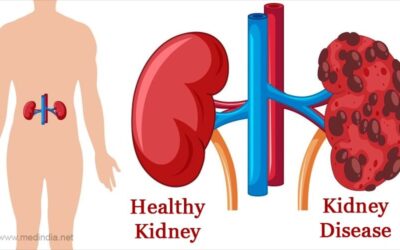Eat Well, Spend Less: Top 5 Ways to Healthy Eating on a Budget
Have you imagined a life where your plate is filled with delicious, wholesome food, and your budget stays happily intact? It’s not a fantasy; it’s your reality waiting to unfold.
nanadwumor

- Plan Your Meals
- Smart Shopping: Buying in Bulk for Health and Savings
- Frozen and Canned Foods: Affordable, Nutritious, and Convenient
- Home Cooking: The Heart of Health and Savings
- Minimizing Food Waste: A Win-Win for Your Budget and the Planet
RECOMMENDED ARTICLES
The Top 5 Benefits of Regular Exercise
Imagine a magic elixir that could transform your life, boost your mood, and make you healthier, all while requiring nothing more than a bit of your time and effort. Well, the good news is, you don't need to imagine it because that 'magic elixir' is real, and it's...
🚨 Heads up! Your Kidney is calling out to you. Top 10 reasons you may be developing kidney problems. Act now! 🚨
Picture this: Your kidneys, decked out in sunglasses and talking on a tiny kidney-sized cellphone, urgently calling for your attention. 😎📞 But they're not ordering pizza; they're trying to tell you something crucial about your health!...
Top 10 Ways to Lose Weight Naturally: Achieve Your Health Goals
Losing weight naturally is a journey that requires patience, consistency, and a commitment to overall well-being. Eat a Balanced Diet Stay Hydrated Increase Physical Activity Practice Portion...
Are you ready to discover the secrets of eating healthily without draining your bank account? In a world where the cost of living keeps rising, it’s essential to find ways to nourish your body and keep your budget intact. The good news is that eating well on a budget is not only possible but also surprisingly simple.
Hop on a journey with me as we explore the top 5 strategies that will help you savor nutritious meals while watching your wallet.
1️⃣Plan Your Meals


One of the most effective ways to eat healthily on a budget is to plan your meals in advance. Start by creating a weekly or monthly meal plan that includes breakfast, lunch, dinner, and snacks. When you plan your meals, you’re less likely to make impulsive, less healthy choices or order takeout, which can be more expensive.
Here’s a simple meal planning strategy:
- Choose affordable, nutritious staples like beans, lentils, rice, and pasta.
- Incorporate seasonal fruits and vegetables into your plan, as they tend to be more affordable and fresher.
- Cook in batches and freeze extra portions for later use to reduce food waste.
2️⃣Smart Shopping: Buying in Bulk for Health and Savings


Are you ready to uncover a budget-friendly secret that can revolutionize your approach to healthy eating? Picture this: a pantry stocked with nutritious staples at a fraction of the cost. It’s not a dream; it’s the power of buying in bulk. In this section, we’ll delve into how purchasing items in larger quantities can benefit both your health and your wallet.
Buying in bulk offers numerous advantages:
- Cost Savings: When you purchase items in larger quantities, you often pay less per unit or ounce. This can translate into significant savings over time, especially for pantry staples like grains, beans, nuts, and dried fruits.
- Reduced Packaging: Buying in bulk means less packaging waste, contributing to a more environmentally friendly shopping experience. You can use reusable containers to store your bulk purchases, further reducing waste.
-
Freshness and Quality: Bulk bins are often replenished with fresh items, ensuring you get high-quality, fresh ingredients. This can be especially beneficial for items like spices and nuts, which can lose flavor and nutritional value over time.
3️⃣ Frozen and Canned Foods: Affordable, Nutritious, and Convenient


It’s time to embrace frozen and canned foods. In this section, we’ll uncover the surprising health benefits and convenience of these culinary gems.
The Frozen and Canned Advantage
Frozen and canned foods offer a multitude of advantages:
- Cost-Effective: They are often more affordable than their fresh counterparts, making them an excellent choice for budget-conscious shoppers.
- Extended Shelf Life: Frozen and canned foods have a longer shelf life, reducing the risk of spoilage and food waste.
- Nutritional Value: Many frozen and canned fruits and vegetables are processed at their peak ripeness, locking in essential nutrients. As a result, they can be just as nutritious as fresh produce.
- Convenience: These foods are incredibly convenient. They are pre-cut, pre-cooked, or pre-seasoned, saving you time and effort in the kitchen.
Embracing Frozen Foods
Frozen foods can be a game-changer for health-conscious budget shoppers:
- Frozen Fruits and Vegetables: These are excellent choices for adding essential vitamins and minerals to your diet. They can be used in smoothies, soups, stir-fries, and more.
- Frozen Seafood: Frozen fish and seafood can be just as nutritious as fresh options. They are perfect for quick and healthy meals.
- Frozen Grains and Legumes: Stock up on frozen brown rice, quinoa, or lentils to add a nutritious base to your dishes.
The Convenience of Canned Foods
Canned foods are versatile pantry staples that can enhance your meals:
- Canned Tomatoes: These are great for making sauces, soups, and stews.
- Canned Beans: Beans such as black beans, chickpeas, and kidney beans are nutritious additions to salads, wraps, and chili.
- Canned Fish: Items like canned tuna or salmon can be used in sandwiches, salads, or pasta dishes.
4️⃣ Home Cooking: The Heart of Health and Savings


Let’s not forget the many benefits of preparing your meals at home and how it can be the key to eating healthily without overspending.
The Power of Home Cooking
Home cooking offers numerous advantages for your health and your wallet:
- Control Over Ingredients: When you cook at home, you have complete control over the ingredients you use. This means you can choose wholesome, nutritious options and avoid excessive salt, sugar, and unhealthy fats often found in restaurant dishes.
- Portion Control: Homemade meals allow you to control portion sizes, helping you manage your calorie intake and avoid overeating.
- Cost Savings: Cooking at home is typically more budget-friendly than dining out or ordering takeout. You can purchase ingredients in larger quantities and make multiple meals from them.
- Meal Customization: Tailoring meals to your dietary preferences, whether you’re vegetarian, vegan, gluten-free, or have specific allergies, is easier when you cook at home.
Getting Started with Home Cooking
If you’re new to cooking or looking to streamline your kitchen skills, here are some tips to help you get started:
- Start Simple: Begin with easy-to-follow recipes that match your cooking skill level. As you gain confidence, you can experiment with more complex dishes.
- Plan Your Meals: Create a weekly meal plan and shopping list to ensure you have all the ingredients you need. This reduces food waste and the temptation to eat out.
- Invest in Basic Kitchen Tools: While you don’t need a fully stocked kitchen, having essential tools like knives, pots, pans, and utensils will make the cooking process smoother.
- Cook in Batches: Prepare larger quantities of meals and freeze individual portions for future use. This is a time-efficient way to have homemade meals on busy days.
Exploring New Cuisines
Home cooking is also an opportunity to explore different cuisines from around the world. Trying out recipes from various cultures can make mealtime exciting and introduce you to new flavors and ingredients.
Quality Family Time
Home-cooked meals can also be a wonderful way to bring family and friends together. It fosters a sense of togetherness and allows you to bond over good food and shared experiences.
5️⃣ Minimizing Food Waste: A Win-Win for Your Budget and the Planet


In a world where every ingredient counts and your kitchen operates with minimal waste, both your budget and the environment can reap the benefits. The concept of reducing food waste isn’t just a vision; it’s an achievable reality.
The Food Waste Problem
Food waste has far-reaching consequences, both financially and environmentally:
- Financial Impact: Tossing out food equates to throwing your money in the trash. By cutting down on waste, you can save significant amounts over time.
- Environmental Impact: Food waste that ends up in landfills produces greenhouse gases, contributing to climate change. By reducing waste, you can lessen your carbon footprint.
Tips to Minimize Food Waste
Here are some practical tips to help you reduce food waste at home:
- Plan Your Meals: Develop a weekly meal plan and create a corresponding shopping list. Purchase only what you need to prevent buying items that may go unused.
- Use Leftovers Creatively: Repurpose leftover ingredients into new dishes. For instance, last night’s roasted vegetables can transform into today’s soup or frittata.
- Understand Expiration Dates: Familiarize yourself with “best before” and “use by” dates. Often, food remains safe to consume beyond these dates if stored properly.
- Proper Storage: Extend the freshness of your food by storing it correctly. Utilize airtight containers and refrigerate or freeze perishables as necessary.
- Composting: Consider initiating a compost pile or utilizing a compost bin to convert food scraps into nutrient-rich soil for your garden.
- Share with Others: If you have excess food that you can’t use, think about donating it to a local food bank or sharing it with neighbors and friends.
A Greener, Leaner Lifestyle
Minimizing food waste isn’t just an environmentally responsible choice; it’s also a savvy financial one. By cutting waste, you’ll reduce your grocery expenses and decrease the frequency of shopping trips. Furthermore, you’ll take pride in knowing you’re contributing to a healthier planet.
Join Our Telegram Group
Join Our WhatSapp Group
You May Also Like…
The Top 5 Benefits of Regular Exercise
Imagine a magic elixir that could transform your life, boost your mood, and make you healthier,...
🚨 Heads up! Your Kidney is calling out to you. Top 10 reasons you may be developing kidney problems. Act now! 🚨
Picture this: Your kidneys, decked out in sunglasses and talking on a tiny kidney-sized cellphone,...
Top 10 Ways to Lose Weight Naturally: Achieve Your Health Goals
Losing weight naturally is a journey that requires patience, consistency, and a commitment to...




0 Comments